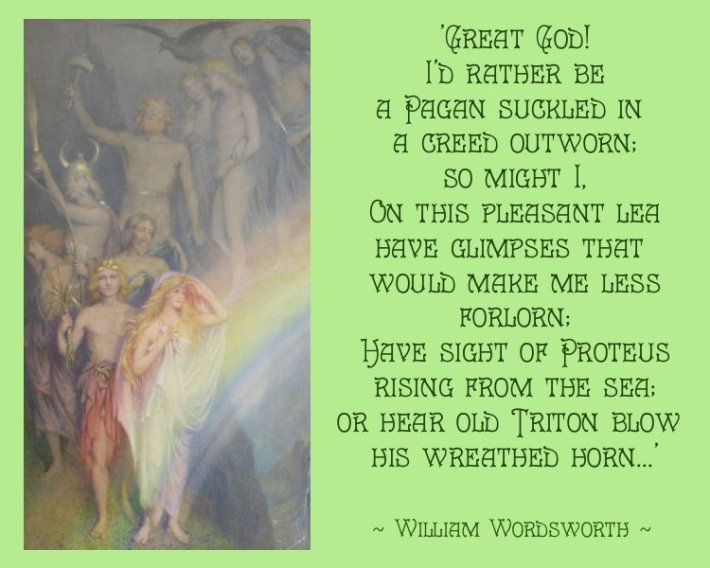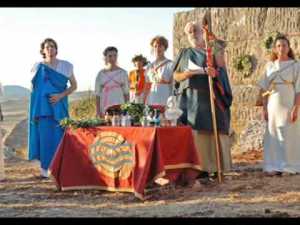
As much as monotheistic religions want to believe it, report it, demand it, the Old Gods never actually died. They’ve always been around, it was just the people of the world, for a while there, were made to believe something else – until it was legal to believe in what felt right for you. The resurgence of polytheistic religions is still very popular, as is the resurgence into atheism. It does not worry me what people choose to believe, but to be left alone to choose is what every human appears to want.
A great online article on the belief in the Olds Gods is Hannah M. G. Shapero’s Ancient Gods: Where are they now? – A fantastic piece covering all aspects of belief, existence, and popularity. I’ll be using this piece in this post, or referring to it – how can I not when it covers everything! Digressing over…
A wise person I have known for over a decade whom I trust with my life once said to me ‘The Old Gods lie dormant until you call them again.’ I think that is completely true. I’m also completely glad that other people out there are thinking just like me! I’m not alone! Even Terry Pratchett has a good point about Gods existing through the power of belief.
‘Gods on the Discworld exist as long as people believe in them and their power grows as their followers increase.’

It’s good to see when you search the internet, evidence across the planet of a resurgence in pagan rituals, and a true belief in the Old Gods. Seek out Doretta Peppa and see how this persistent and interesting woman brings back the rituals of the Olympic Gods. They may not be exactly like the ones from the olde days, but the fact that they are there doing it, means a lot. It makes people see what is going on – not just in Athens, but other parts of the world – AND that it’s really quite harmless. I have seen, and I really believe, that the general public, when they see a pagan ritual, begin to realise they appear pretty inoffensive. I’ve felt BAD vibes in a born-again church, but never in a pagan ritual and I think witnesses think and feel the same thing. Some don’t want to believe in it, damning it as demonic, even if they see it is harmless – a line in an article says about Peppa’s rites:
‘The Greek Orthodox Church has said they are miserable resuscitators of a degenerate dead religion.’

It seems to be easy to worry the Church. The religion may have died, but the Gods didn’t. You’ve got several countries looking at doing religious rites involving the Old Gods, using festival, masquerade, fire, and procession – like Latvia, Norse/Asatru ritual, Fire Festivals, and low-key Halloween ceremonies…like this one…
The amazing Rappahannock Halloween Festival
The variety is astounding. People are always finding out a way to connect with the Old Gods, letting them know they are aware they are out there. And the Gods know it! It’s a great shame the monotheistic religions are down on the poor deities, convincing people it’s not alright to worship such Gods. As Shapero says…
‘…some of the more fanatical absolute monotheists, among whom can be counted radical Evangelicals and other fundamentalists, the old gods did exist, but they were demons. They were actually evil beings, sent by Satan to deceive people. They were idols – false things worshipped by ignorant people. Once the true monotheism has arrived, there is no excuse to worship these idols. Therefore they must be smashed, and Christianity and Islam have done a lot of smashing over the years. Do they still exist? Yes, the way Satan and the demons still exist…’
 Priestesses at the Athens Olympics, 2004
Priestesses at the Athens Olympics, 2004
At least they admit they exist! I’m fine with that – I’ll have my rant later about my own opinion. Now, coming to experiences with the Gods. I’ve had my fair share of experiences with the divine, and perceived it in my own way. I’ve had moments, where I have emanated pure emotion and had a response from something that comforted me – in a moment of sadness, I had a voice in my head that was certainly not me, and it helped me in my lonely, desperate moment. AND it was not just a voice, I was given some hindsight into something that would one day come to me – I actually got a glimpse into the future! I had called to Her in desperation, and She came! Others have told me of their experiences with the divine, and would have their own description for it – God, the Virgin Mary, the Goddess, whatever. Whatever we believe comes to us in those times – and often there is something in that moment where you somehow just KNOW that it is NOT your own head talking to yourself. You’re too emotional to think straight let alone give yourself a positive answer. That’s how you know you were not alone that moment. I’ve had that. It’s profound. But what about specific encounters with the Gods? I know of two accounts I want to write about – one from a trusted friend, a no-nonsense person who doesn’t take things lightly, and is not easily fooled, and another woman, whom I met once, whom I don’t really trust as much – anyway, both of them had an ‘encounter’ with the Horned God. And yes, I mean a sexual encounter. I know my friend’s story better – from what I gathered, this encounter occurred, not during sleep or physical broad daylight, but must have been during a trance or meditation. Nor am I aware of drugs being involved. But I asked my friend all the details – she distinctly recalls holding onto the antlers during the sexual encounter. That makes me think it was during a trance, or even some other world visitation. As a reader and researcher of strange phenomenon and the supernatural, I LOVE these kinds of stories. I file them away in my head, neither believing nor disbelieving them. But I know I have every right to believe it if I want. Would a skeptic laugh at me? Probably, but he can argue till he’s blue in the face, I will believe what I want.

Well, hello!
Another encounter I know of was during ritual – an extremely dark Goddess turned up during ritual, sought out and pointed to a particular disturbed person in the circle. This person was a cheeky one, and She knew it, and made herself known. He probably wet himself after that.
There will be people all over the world with stories to tell of experiencing the Old Gods – physically or spiritually – that would be quite a fun read! As an academic, I’ve read enough to learn something about the world, something about religion and something about belief. I cannot, in all honesty, even remotely believe that the Bible is a useful, reliable book that a human being should refer to. To me, it simply goes against human behaviour. However, belief in the Gods is certainly more plausible in my world. I once read Marion Zimmer Bradley’s Mists of Avalon. To be honest, it was a painful read, but what I LOVED, what warmed my heart and made me feel at home, was the characters in the book who stayed devoted to the Goddess and to Avalon. They did not bow down to the Christian religion, no matter how popular and powerful the religion was becoming. During the book, all I remember wanting to happen was that Morgaine went back to Avalon with her pagan lover Accolon, stay there, and let the foolish outside world war with each other till they all died out.
My opinions…
I’ve never told a Christian that his God doesn’t exist, but deep down I’ve thought that he, as a God, is rather boring. It’s just my preference, I enjoy a saucy God/dess just as much as the next person. When I anthropomorphise the Gods with characteristics, I think of the sexy, frivolous, yet vindictive Aphrodite, The sexual and cheeky, yet childishly playful Pan, and the wise and serene Athena, who has a scary streak. But when I think of the Christian God, he is the lonely shut-in that contradicts himself – according to the description of his followers. The level of importance the Christian God sits to his followers and priests, makes me think that I cannot speak with him. Jeanne D’Arc was envied and killed because she was spoken to by God via the saints – she was not a man let alone a priest, and we can’t be having with that. Nor have I ever thought the Christian God was evil, however a lot of his followers like to think he’s judgemental, vicious and damning. What a way to make your God sound unpleasant! In the end, it’s not the God that puts me off the religion – it’s the patriarchal, and often misogynistic domination of the world, where the sacred act of sex is a sin, where the selfish belief that their religion is the true one. It just ISN’T, in fact, it’s probably the furthest from it.
Today, people keep going on about the Virgin Mary being like the Goddess – but to me, that is not good enough. I don’t want someone clad in blue, with no features but the face showing, and no womanly figure to rever. I just don’t care enough. Mary was seen and not heard, carried a baby, raised it, but did nothing else – She was put in her place. They say the Gods are still alive in Christian religions – the Virgin Mary is like the Goddess, the saints are like separate Gods, etc etc – But I don’t want ANYTHING to do with any Christian religion at all. Before you say anything, I know our world is very Christocentric, and neo-paganism probably does have elements of Christianity that we don’t notice, but there is not much we can do about that in this world. I don’t think the Christian God in all his omnipresence and knowledge, gives a rat’s arse that I don’t worship him, only his followers would care about such things. I’m inclined to think he is not as bad as his followers say he is.
I’m not selfish enough to say my religion is the true religion – there is no true religion, because there are so many, and if the individual is kind, happy and lives a good life not harming others, then all the better. I’m also not selfish enough to say ‘my gods were around first, your god was invented at the council of Nicaea, and therefore is not real.’ There is something within the power of belief, again Shapero says:
Can something that was once worshipped disappear into oblivion? Popular legends and stories tell of ethereal beings, such as the fairy “Tinkerbell,” whose very existence depends on the belief of human beings. When people cease to believe in these sweet spirits, they disappear into non-existence, like bubbles. Are the gods the same way? If no one believes in them, as I said earlier in this essay, do gods die? If not, then what lives on?
Of course, you could say there is no point in having one God, and then demons, angels and saints. Just make them all gods – that’s what they are, they’re spirits, earth-bound, celestial, and they are revered. I once insulted someone when I said that Satan was a Christian god. I did not care either way, but he tried to argue his point – which he is completely allowed to do – but sorry love, there is no convincing me, when I sometimes see Christians talk about the Devil almost MORE than their God, it makes me wonder. We all know talking of something gives it power. Perhaps they should worry about who they prefer to admire. The best Christians I’ve ever met, LOVE that pagans have their own Gods and are happy for them, as they are happy with their God. They are the best examples of humans out there.
I’m kind of tired of hearing about the bible, the Christian God, but I know I cannot avoid it. I’d rather read more about the Mithraic religions, Gilgamesh, and bring back the Elusinian Mysteries. Hell, even build Roman baths like they used to! Do some parade that involves a thyrsus and a laurel wreath. What certainly is important in the world today is that we let other people believe what they want, and not laugh at them. I’ve been rude in the past but only to the fundamental, pushy people who joined cults in the end, but in reality, I am happy for all to be who they are, as long as they leave me alone to live how I want.
In service of the Gods,
~ Daracha














